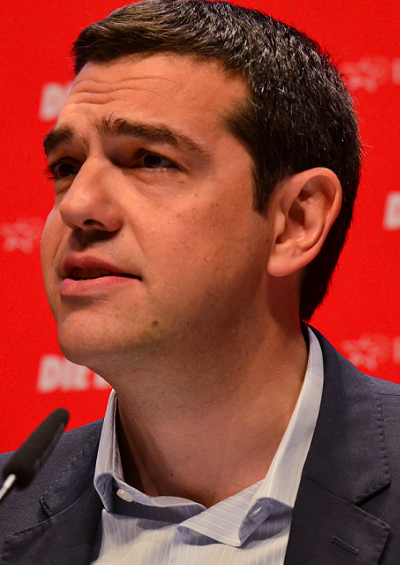Tsipras: A Turnaround Artist?
Greek prime minister’s U-Turn shows politics dominates economics.
July 10, 2015

The specter of a Grexit seems to be exiting the European stage. In what is the most remarkable U-turn in recent European political history, Greek Prime Minister Alexis Tsipras has capitulated to economic reality, political reality — and his own ambitions. (See TG’s recent coverage of Greece here)
The economics became clearer and clearer after the absurd referendum. Voters were asked to vote No to austerity, but Yes to Europe, as even the posters Syriza covered Greece with put it.
But the real referendum was taking place on the streets of Greece as queues formed in front of every ATM in the boiling July heat.
Tsipras imposed this humiliation on his fellow Greeks by making the old and the weak queue up to withdraw a little of their own money. Capital controls cut the import of elderly folk’s prescribed medication. Greece began to look more like Venezuela or a communist era state with its endless queues and rationing.
This semi-siege economy could not continue much longer and so Tsipras agreed to meet the conditions set previously by the dreaded “Europeans.” Taxes will rise, the bloated military budget will be cut, airports will be privatized and even the shipping industry will pay a little to the national coffers.
The alternative was the bankruptcy of Greece. With a little face-saving talk of debt reduction from EU Council President Donald Tusk, the bitter pill was swallowed.
In 1920, Lenin wrote a famous pamphlet called ‘Left-Wing’ Communism: An Infantile Disorder as he attacked the ultra-leftists of his party who refused to accept the compromises necessary to hold on to power even at the expense of what the party once believed in.
Tsipras is now producing howls of infantile protests from some Syriza MPs as they realize the windy statements made until now — let’s call them Varoufakisms — have become inoperative.
François Hollande, keen to establish his left credentials and show he wasn’t a Berlin patsy, sent his top finance technocrats to help redefine the Greek offer — but also to tell Tspiras he had to sign.
Mrs. Merkel does not want to celebrate her tenth anniversary in power by saying the Parthenon is no longer in Europe (or at least the eurozone). But the biggest pressure was on Tsipras from the Greek people who said over and over again they wanted to keep the Euro and would never forgive a political party and its leader that sold the pass to take them backward to the primitivism of the drachma and devaluations.
Ambitious Mr. Tsipras
And this is where the young leader’s political ambition enters the story. Tsipras, so reliable sources in Athens report, was briefly hospitalized this week as some kind of panic attack breakdown hit him. That is no real surprise as no young, untested leader has made so many mistakes in such a short time — and had so much pressure on his shoulders.
Perhaps in his few hours of rest, Saul become Paul and the Tsipras who preached radical leftism is now a man who sees every chance of remaining leader of Greece for some time, given the weakness of the old parties.
But like a Felipe Gonzalez, or a Willy Brandt, or a Tony Blair he has to change himself and his party in order to change Greece. That metamorphosis is under way before our very eyes.
Most of the international writing on the Greek crisis has been by economic commentators. But the real story is deeply political. Tsipras’s evolving embrace of reality is foretold in many political dramas.
It can still go wrong. EU member states, angry with their own internal economic problems, may veto any deal. But that is not easy to do against the combined weight of Germany and France.
The EU and IMF may lack imagination to find words on debt relief — even if Poland was awarded that in the early 1990s following clever work on Capitol Hill to give post-communist Poland a fighting chance to grow.
But all politics is about power and office. Tsipras and his Syriza colleagues have tasted both. Some have waited 30 years to enjoy the trappings of office and the chance to make government policy, not just lecture on it. Those not interested can go off on the global left-wing talkfest circuit, as Mr. Varoufakis undoubtedly will.
Count on Mr. Tsipras not to throw away his chance to govern.
He has run away from a full-on confrontation with Europe and with economic reality. He lives to fight another day. This is but the prologue to a drama about Greece Sophocles or Euripides might write.
Greece stays in the Euro and in the EU. And the politics of Greece have become the most exciting and interesting in Europe.
Meanwhile, attention now turns to Brexit.
Takeaways
Greece began to look more like a communist era state with its endless queues and rationing.
Hollande, keen to show he wasn't a Berlin patsy, sent his top finance technocrats to help redefine the Greek offer.
Merkel does not want to celebrate her tenth anniversary in power by saying the Parthenon is no longer in Europe.
No young, untested leader has made so many mistakes in such a short time and had so much pressure on his shoulders.
Most of the writing on the Greek crisis has been by economic commentators. The real story is deeply political.
All politics is about power and office. Tsipras and his Syriza colleagues have tasted both.
Read previous

Global Economy
Has Tsipras Delivered?
July 10, 2015
